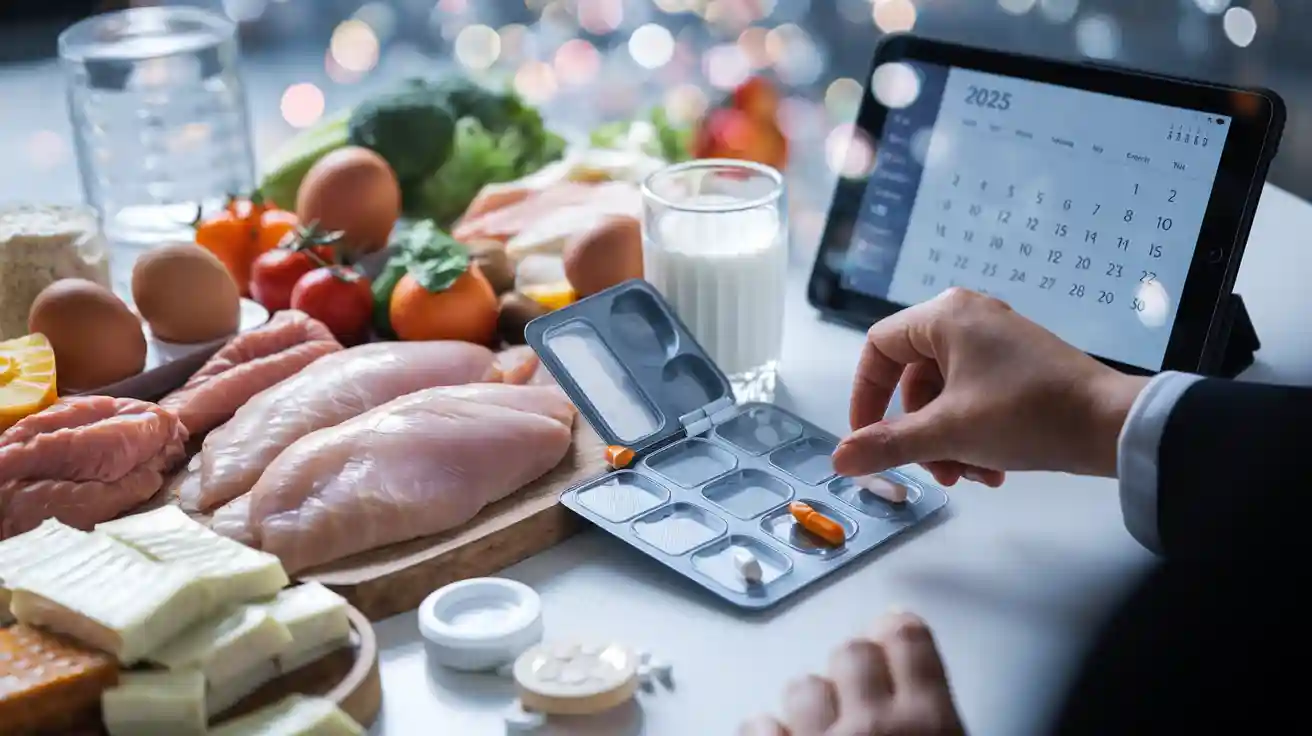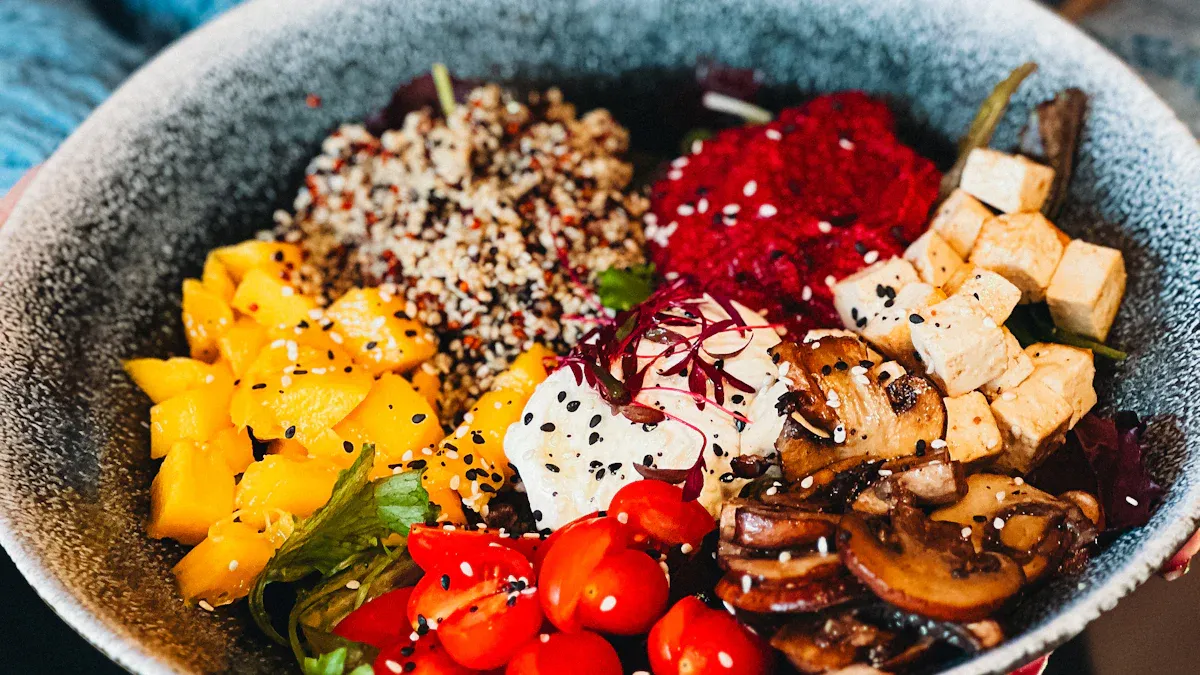How Protein Intake Supports Adderall Use in 2025
Table of Contents

You might wonder if protein intake can help when taking adderall. The answer is yes. Eating enough protein gives your brain steady fuel while taking adderall. This can make the medicine last longer and help limit side effects. Many people find that protein is the best way to take adderall and feel good during the day. You should always talk to your doctor before making changes, since side effects from adderall can be different for everyone.
Adderall and Nutrition
How Adderall Works
When you take adderall for adhd, the medicine changes how your brain uses neurotransmitters. Neurotransmitters are chemicals that help your brain send messages. Adderall increases dopamine and norepinephrine in your brain. These changes help you focus, improve attention, and reduce impulsive behavior. You may notice that your adhd symptoms, like trouble paying attention or acting without thinking, get better when your brain has more dopamine.
Here is a quick look at how adderall affects your brain:
| Mechanism Aspect | Description |
|---|---|
| Reuptake Blockade | Adderall keeps neurotransmitters like dopamine in the brain longer by blocking their reabsorption. |
| Stimulation of Release | It makes your brain release more neurotransmitters, boosting their levels. |
| Monoamine Oxidase Inhibition | Adderall slows down the enzyme that breaks down neurotransmitters, so they stay active longer. |
| Resulting Effect | You get better attention, focus, and less impulsivity, which helps with adhd symptoms. |
Why Nutrition Matters
Your diet and nutrition play a big role when you are taking adderall for adhd. Adderall can lower your appetite, making it hard to eat enough. If you do not get enough food, your brain and body may not work well. Poor nutrition can cause symptoms like headaches, brain fog, and tiredness. These symptoms can look like adhd symptoms, so it is important to eat well.
Tip: Eating a nutrient-rich diet is the best way to take adderall and feel your best every day.
Adderall can also block your body from absorbing key nutrients. You may become low in magnesium, B vitamins, vitamin C, zinc, and iron. These nutrients help your brain make neurotransmitters and keep your attention sharp. If you do not get enough, your adhd symptoms may get worse. Many people with adhd already have low levels of these nutrients before taking adderall.
You should watch for symptoms like brain fog, headaches, or feeling impulsive. These can mean you need more nutrition support. A diet full of whole foods, plus supplements like magnesium and vitamin C, can help your brain and body stay healthy. Remember, the right diet and nutrition can make a big difference when taking adderall for adhd.
Protein Intake and ADHD

Brain Function and Protein
Your brain needs the right fuel to work well, especially when you have adhd. Protein helps your brain make neurotransmitters, which are chemicals that control attention, mood, and alertness. When you eat protein, your body breaks it down into amino acids. These amino acids help your brain produce dopamine, serotonin, and norepinephrine. These neurotransmitters help you stay focused and calm.
Studies show that eating protein-rich foods in the morning and after school can improve attention and help adhd symptoms. Saroj Kumar, founder of Health Review Live, explains that protein is necessary for brain health and helps reduce blood glucose spikes that may cause hyperactivity. You can choose eggs, beans, nuts, fish, or lean meats to support your brain function. Child psychologist Vincent J. Monastra, Ph.D., found that a protein-rich breakfast and lunch improve concentration and reduce side effects like irritability from adhd medications.
Tip: Protein promotes alertness and helps you feel steady throughout the day. Try adding peanut butter or a protein shake to your breakfast for better mental focus.
Protein intake also helps stabilize blood sugar levels. When your blood sugar stays steady, your brain can keep up with learning and thinking. If you eat only sugary foods, your energy may spike and crash, making it harder to pay attention. Protein slows down how your body digests carbohydrates, so you avoid these crashes. You can spread protein intake throughout the day to help your brain stay sharp and support cognitive function.
Here is a table showing how protein supports your brain and adhd:
| Benefit of Protein | How It Helps ADHD and Brain Function |
|---|---|
| Amino acids | Build neurotransmitters for attention and mood |
| Blood sugar control | Prevents energy spikes and crashes |
| Alertness | Keeps you focused and calm |
| Symptom control | Reduces hyperactivity and impulsivity |
Eating enough protein gives your brain the tools it needs to manage adhd symptoms. You may notice better attention, less impulsivity, and improved cognition when you include protein in your meals.
Protein’s Role in Medication Absorption
Protein plays a key role in how your body absorbs adhd medication like Adderall. When you take Adderall with protein-rich foods, you help your brain use the medicine more effectively. Protein provides amino acids such as tryptophan and tyrosine, which help your brain make neurotransmitters. These neurotransmitters, especially dopamine, are important for attention and mood.
You can boost the effects of Adderall by eating protein at breakfast and lunch. Research by neuroscientist Richard Wurtman, Ph.D., shows that protein intake triggers the production of alertness-inducing neurotransmitters. This means your brain gets more support for focus and learning. Protein also helps stabilize blood glucose, so you avoid energy crashes that can make adhd symptoms worse.
- Protein consumption provides amino acids like tryptophan, tyrosine, and phenylalanine, which help your brain make neurotransmitters for attention and cognition.
- Protein intake helps keep your blood sugar steady, which supports learning and memory.
- Children with adhd who eat protein-rich breakfasts show better attention and less hyperactivity than those who eat mostly carbohydrates.
- Protein influences gut microbiota, which can affect neurotransmitter pathways important for adhd management.
You should try to include protein in every meal to help your brain and body use Adderall well. Spreading protein intake throughout the day helps your brain keep making neurotransmitters. This supports cognitive function and helps you manage adhd symptoms.
Note: Omega-3 and omega 3 fatty acids also support brain health and work with protein to improve cognition and attention. You can find these fatty acids in fish, nuts, and seeds.
Protein intake is linked to better cognitive performance because amino acids from protein are essential for making neurotransmitters that regulate cognition and mood. If you do not get enough protein, your brain may not make enough neurotransmitters, which can make adhd symptoms worse. Some studies show that nutrient utilization and digestion may also affect how your brain uses protein and medication. More research is needed, but you can help your brain by eating enough protein and choosing healthy foods.
Diet Strategies for Adderall Users

Best Protein Sources
You need to choose the right foods to support your brain when taking adderall. Nutritionists recommend several protein-rich foods that help you stay focused and keep your energy steady. These foods give your brain the building blocks it needs for alertness and concentration. You can include these options in your daily diet:
- Lean meats like skinless turkey or chicken
- Wild fish such as salmon or tuna
- Eggs, which work well for a protein-rich breakfast or snack
- Beans, but use them in moderation
- Raw nuts and seeds
- Soy products like tofu or tempeh
- Low-fat dairy products, including cheese and milk
- Protein powders made from pea or rice (avoid whey protein)
- Greek yogurt, especially full-fat, for brain health
- Nut butters, such as peanut butter or sunflower seed butter
These foods support neurotransmitter production and help balance your blood sugar. You can improve your focus and reduce hyperactivity by adding them to your meals. Eggs and Greek yogurt stand out as top choices for a protein-rich breakfast. Nuts and seeds also give you healthy fats and vitamins that support your nervous system.
Tip: Start your day with a protein-rich breakfast to help your brain stay sharp and ready for learning.
Timing Protein Intake
The timing of your meals can make a big difference when taking adderall. You should eat a protein-rich breakfast before your first dose. This helps your brain get the nutrients it needs for alertness and steady energy. Eating lean protein in the morning supports focus and helps you avoid energy crashes later in the day.
You can also benefit from eating protein at lunch and after school. Spreading protein intake throughout the day keeps your blood sugar stable and supports your brain as the effects of adderall change. Try to avoid high-fat meals right before taking adderall. High-fat foods slow down how your body absorbs the medicine and can delay its effects. For the best way to take adderall, eat a balanced meal with lean protein and complex carbohydrates about 30 minutes before your dose.
| Meal Timing | What to Eat | Why It Helps |
|---|---|---|
| Breakfast | Eggs, Greek yogurt, nut butter on whole grain toast | Boosts alertness and focus for the morning |
| Lunch | Grilled chicken salad, beans, or tofu with veggies | Maintains steady energy and supports attention |
| Snack | Cheese, nuts, or a protein shake | Prevents energy dips and supports brain function |
| After School | Trail mix, yogurt, or boiled eggs | Helps you recover and stay focused for homework |
Note: Drink plenty of water during the day. Staying hydrated helps your brain and body use adderall more effectively.
Meal Ideas
You can make your diet work for you by planning simple, balanced meals and snacks. Choose foods that combine protein, healthy fats, and complex carbohydrates. This helps you feel full, keeps your energy steady, and supports your brain while taking adderall.
Here are some easy meal and snack ideas:
- Scrambled eggs with spinach and whole grain toast
- Greek yogurt with berries and walnuts
- Grilled chicken or tofu salad with mixed greens and nuts
- Whole grain wrap with turkey, avocado, and lettuce
- Lentil soup with whole grain bread
- Baked salmon with steamed broccoli and quinoa
- Trail mix with nuts and seeds
- Cheese slices with apple or pear
- Carrot sticks with hummus
- Banana with almond butter
- Overnight oats with chia seeds and almond milk
- Smoothie with spinach, banana, almond milk, and protein powder
You can prepare meals in advance to save time. Cook extra chicken, salmon, or boiled eggs at the start of the week. Store them in the fridge for quick lunches or snacks. You can also make large batches of soups or casseroles and freeze them for busy days.
| Day | Breakfast | Lunch | Dinner | Snack |
|---|---|---|---|---|
| 1 | Scrambled eggs with spinach | Grilled chicken salad | Baked salmon with broccoli | Carrot sticks with hummus |
| 2 | Oatmeal with berries | Turkey wrap with avocado | Stir-fried tofu with veggies | Mixed nuts |
| 3 | Greek yogurt with walnuts | Lentil soup | Grilled shrimp with quinoa | Apple with almond butter |
Callout: Choose snacks that are high in protein and fiber. These help you stay full and focused between meals.
You should avoid skipping meals. Eating regular, balanced meals is important for keeping your brain healthy and making the most of your adderall. A good diet supports your medication and helps you feel your best every day.
Foods and Habits to Avoid
What to Avoid with Adderall
You need to pay close attention to what you eat and drink when taking adderall for adhd. Some foods can lower how well the medicine works in your brain. Acidic foods, especially those high in vitamin C like oranges, grapefruits, lemons, and limes, can reduce adderall’s absorption. When you eat these foods or drink citrus juices, your stomach becomes more acidic. This makes your body get rid of the medicine faster, so your brain does not get the full benefit. Experts suggest you take adderall at least one hour before eating or drinking anything with vitamin C. You can have your vitamin C-rich foods or supplements later in the day to help your brain recover without interfering with your medication.
High-fat meals also affect how your body uses adderall. If you eat a heavy or greasy breakfast, your brain may not get the medicine as quickly. Studies show that a high-fat meal can delay the time it takes for adderall to start working and can even lower the amount your brain absorbs. This is especially true for extended-release forms of adhd medication. Try to eat a balanced diet with lean protein and complex carbs instead.
Tip: Avoid taking adderall with orange juice, grapefruit juice, or vitamin C supplements. Choose water or milk for your morning drink.
| Foods to Avoid | Why They Interfere with Adderall |
|---|---|
| Citrus fruits & juices | Increase stomach acidity, lower absorption |
| Vitamin C supplements | Speed up removal of medicine from body |
| High-fat meals | Delay absorption, reduce effectiveness |
Habits That Impact Effectiveness
Your daily habits can also change how well adderall helps your adhd symptoms. Skipping meals is one of the biggest mistakes. When you skip breakfast or lunch, your brain does not get the steady fuel it needs. This can make you feel tired, moody, or unfocused. Your diet should include regular meals with protein to keep your brain sharp.
Eating too many simple carbohydrates, like white bread, candy, or soda, can cause your blood sugar to spike and crash. These ups and downs make it hard for your brain to stay focused. Simple carbs can also trigger cravings and make adhd harder to manage. A diet with more protein and complex carbs helps your brain make the neurotransmitters it needs for attention and mood.
- Skipping meals lowers focus and mood, making adhd symptoms worse.
- Too many simple carbs cause energy crashes and poor concentration.
- Blood sugar swings can reduce adderall’s benefits for your brain.
- Protein in your diet supports steady brain function and reduces side effects like irritability.
Callout: Eat regular meals with protein and complex carbs to help your brain and get the most from your adhd medication.
A healthy diet supports your brain and helps adderall work better. You can avoid many side effects by making smart food choices and keeping good habits every day.
Protein-rich foods help you stay focused and reduce side effects when taking Adderall. You should eat regular, balanced meals with lean proteins, fruits, vegetables, and whole grains. Experts recommend smaller, frequent meals and staying hydrated. Avoid high-fat foods and vitamin C near your medication time. No official protein guidelines exist, but a healthy diet supports your brain. Always talk to your healthcare provider before changing your diet or adding supplements. 🥚🥦
- Eat nutrient-dense foods at regular intervals.
- Include protein and fiber for steady energy.
- Consult your doctor for personalized advice.
FAQ
Can eating more protein make Adderall work better?
You can help Adderall work better by eating enough protein. Protein gives your brain the building blocks for focus and energy.
Tip: Start your day with eggs or Greek yogurt for a brain boost.
What is the best time to eat protein when taking Adderall?
You should eat protein at breakfast before your first dose. You can also add protein at lunch and snack time.
| Time | Protein Food |
|---|---|
| Breakfast | Eggs, yogurt |
| Lunch | Chicken, beans |
| Snack | Nuts, cheese |
Are there any protein foods I should avoid with Adderall?
You should avoid high-fat protein foods like fried meats or full-fat cheese near your medication time. These foods can slow down how your body absorbs Adderall.
Note: Choose lean meats, eggs, or low-fat dairy for best results.
Can I take Adderall with a protein shake?
You can take Adderall with a protein shake if it does not contain citrus or high-fat ingredients.
🧃 Avoid shakes with orange juice or heavy cream.
🥤 Try almond milk, protein powder, and banana for a safe option.

Poseidon
Master of Nutritional Epidemiology, University of Copenhagen, Herbal Functional Nutrition Researcher
Focus: The scientific application of natural active ingredients such as Tongo Ali, Horny Goat Weed, and Maca to sexual health and metabolic regulation.
Core Focus:
Men: Use a combination of Tongo Ali (an energizing factor) + Maca (an energy reserve) to improve low energy and fluctuating libido.
Women: Use a combination of Horny Goat Weed (a gentle regulator) + Maca (a nutritional synergist) to alleviate low libido and hormonal imbalances.
Stressed/Middle-Aged Adults: This triple-ingredient synergy supports metabolism, physical strength, and intimacy.
Product Concept:
Based on traditional applications and modern research (e.g., Tongo Ali promotes testosterone-enhancing enzyme activity, and icariin provides gentle regulation), we preserve core active ingredients and eschew conceptual packaging—using natural ingredients to address specific needs.
Simply put: I'm a nutritionist who understands "herbal actives." I use scientifically proven ingredients like Tongo Ali, Epimedium, and Maca to help you make "sexual health" and "nutritional support" a daily routine.
